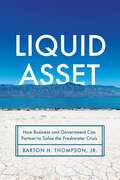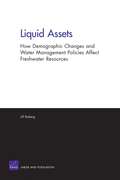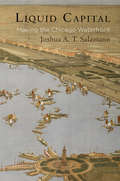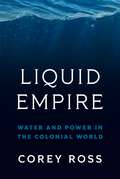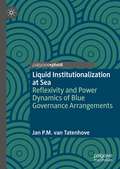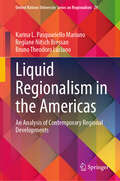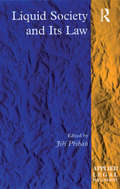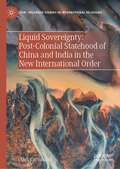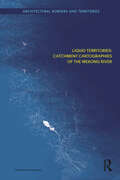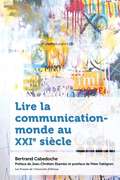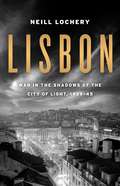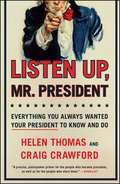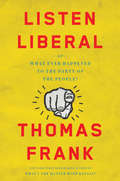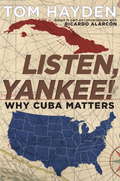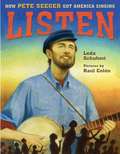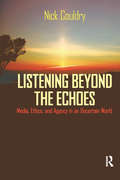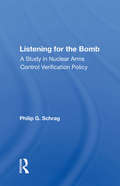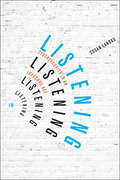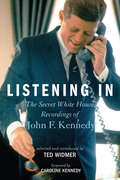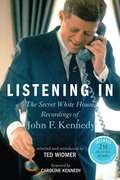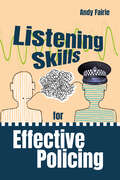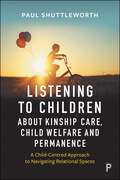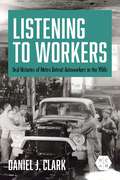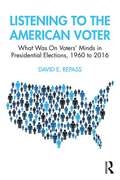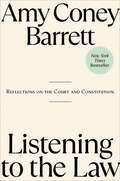- Table View
- List View
Liquid Asset: How Business and Government Can Partner to Solve the Freshwater Crisis
by Barton H. Thompson Jr.A sweeping, policy-oriented account of the private and public management of the world's essential natural resource. Governments dominated water management throughout the twentieth century. Tasked with ensuring a public supply of clean, safe, reliable, and affordable water, governmental agencies controlled water administration in most of the world. They built the dams, reservoirs, and aqueducts that store water when available and move that water to areas with increasing populations and economies. Private businesses sometimes played a part in managing water, but typically in a supporting position as consultants or contractors. Today, given the global need for innovative new technologies, institutions, and financing to solve the freshwater crisis, private businesses and markets are playing a rapidly expanding role, bringing both new approaches and new challenges to a historically public field. In Liquid Asset, Barton H. Thompson, Jr. examines the growing position of the private sector in the "business of water." Thompson seeks to understand the private sector's involvement in meeting the water needs of both humans and the environment, looks at the potential risks that growing private involvement poses to the public interest in water, and considers the obstacles that private organizations face in trying to participate in a traditionally governmental sector. Thompson provides a richly detailed analysis to foster both improved public policy and responsible business behavior. As the book demonstrates, the story of private businesses and water offers a window into the serious challenges facing freshwater today, and their potential solutions.
Liquid Assets
by Jill BobergMost writings linking demographic trends to water availability often look only at population-growth effects, treating water supplies as static and population as increasing, inexorably leading to a water-availability crisis. This report's more holistic view of the interaction between demographics and water resources considers more demographic and local water-availability variables. It focuses on conditions in developing countries, where these factors intersect with the fewest socioeconomic resources to mediate.
Liquid Capital: Making the Chicago Waterfront (American Business, Politics, and Society)
by Joshua A. SalzmannIn the nineteenth century, politicians transformed a disease-infested bog on the southwestern shore of Lake Michigan into an intensively managed waterscape supporting the life and economy of Chicago, now America's third-most populous city. In Liquid Capital, Joshua A. T. Salzmann shows how, through a combination of entrepreneurship, civic spirit, and bareknuckle politics, the Chicago waterfront became a hub of economic and cultural activity while also the site of many of the nation's precendent-setting decisions about public land use and environmental protection. Through the political saga of waterfront development, Salzmann illuminates Chicago's seemingly paradoxical position as both a paragon of buccaneering capitalism and assertive state power.The list of actions undertaken by local politicians and boosters to facilitate the waterfront's success is long: officials reversed a river, built a canal to fuse the Great Lakes and Mississippi River watersheds, decorated the lakeshore with parks and monuments, and enacted regulations governing the use of air, land, and water. With these feats of engineering and statecraft, they created a waterscape conducive to commodity exchange, leisure tourism, and class harmony—in sum, an invaluable resource for profit making. Their actions made the city's growth and the development of its western hinterlands possible. Liquid Capital sheds light on these precedent-making policies, their effect on Chicago's development as a major economic and cultural force, and the ways in which they continue to shape legislation regarding the use of air and water.
Liquid Empire: Water and Power in the Colonial World
by Corey RossA bold new account of European imperialism told through the history of waterIn the nineteenth and twentieth centuries, a handful of powerful European states controlled more than a third of the land surface of the planet. These sprawling empires encompassed not only rainforests, deserts, and savannahs but also some of the world&’s most magnificent rivers, lakes, marshes, and seas. Liquid Empire tells the story of how the waters of the colonial world shaped the history of imperialism, and how this imperial past still haunts us today.Spanning the major European empires of the period, Corey Ross describes how new ideas, technologies, and institutions transformed human engagements with water and how the natural world was reshaped in the process. Water was a realm of imperial power whose control and distribution were closely bound up with colonial hierarchies and inequalities—but this vital natural resource could never be fully tamed. Ross vividly portrays the efforts of officials, engineers, fisherfolk, and farmers to exploit water, and highlights its crucial role in the making and unmaking of the colonial order.Revealing how the legacies of empire have persisted long after colonialism ebbed away, Liquid Empire provides needed historical perspective on the crises engulfing the world&’s waters, particularly in the Global South, where billions of people are faced with mounting water shortages, rising flood risks, and the relentless depletion of sea life.
Liquid Institutionalization at Sea: Reflexivity and Power Dynamics of Blue Governance Arrangements
by Jan P.M. van TatenhoveThis book presents an innovative theory of liquid institutionalization at sea and explores the building blocks of this theory focusing in particular on institutionalization, blue governance arrangements, reflexivity and power. The book opens with an overview of stability and change in new institutional theory before moving on to discuss liquid institutionalization in more detail. The author applies this approach to three different cases: Arctic shipping; deep seabed mining; and transboundary regionalization in Europe. For each of these cases the book describes the emerging blue governance arrangements, the type of liquid institutionalization and the consequences this has for power and reflexivity.
Liquid Regionalism in the Americas: An Analysis of Contemporary Regional Developments (United Nations University Series on Regionalism #29)
by Karina L. Pasquariello Mariano Regiane Nitsch Bressan Bruno Theodoro LucianoThis book develops a comprehensive analysis of contemporary regionalism in the Americas, which the authors characterise as Liquid Regionalism, given its unstable, flexible and loose characteristics. It innovates by introducing a new concept to assess regional initiatives in the American continents, contributing to Latin American and comparative regionalism research agendas. The book analyses major regional projects in the Americas and develops these into a novel typology of consultation, cooperation and integration. This typology helps explain the level of commitments and institutional depth of regional initiatives across the continent. The book is for scholars, postgraduate and undergraduate students interested in the regional and political dynamics of the Americas across the social sciences, including international relations, political science, sociology, international political economy, international trade, and history.
Liquid Society and Its Law (Applied Legal Philosophy)
by Jiří PřibáňThis collection of essays brings together Zygmunt Bauman and a number of internationally distinguished legal scholars who examine the influence of Bauman's recent works on social theory of law and socio-legal studies. Contributors focus on the concept of 'liquid society' and its adoption by legal scholars. The volume opens with Bauman's analysis of fears and policing in 'liquid society' and continues by examining the social and legal theoretical context and implications of Bauman's theory.
Liquid Sovereignty: Post-Colonial Statehood of China and India in the New International Order (Palgrave Studies in International Relations)
by Aleš KarmazinThis book project studies the variation of sovereignty in international order by analysing how the general model of sovereignty is localised in the political practice of two major non-Western rising powers, namely China and India. It aims to investigate how the sovereignty of these states is constituted, which includes the question of how sovereignty works and becomes constituted in specific contexts and cases that fall outside the discourses and positions of the so-called Westphalian (conservative, absolutist) sovereignty that is dominantly advocated by these two states on a global level. The core of this project explores specific contested cases and situates them vis-à-vis the broader approaches of China and India to sovereignty. I specifically analyse four particular cases: China’s approach to sovereignty in relation to Hong Kong and Taiwan and India’s approach to sovereignty in relation to Bhutan and Kashmir. In doing so, I will illustrate that sovereignty is a flexible and plastic phenomenon which can be intertwined with principles, models or practices that are usually seen as divergent from or contradicting sovereignty; for example, those that derive from China’s and India’s imperial and colonial history.
Liquid Territories: Catchment Cartographies of the Mekong River (Architectural Borders and Territories)
by Christoforos RomanosIn addition to being a fundamental concept for planning the water infrastructure which supports extensive agricultural economies across Southeast Asia, knowledge of the Mekong River’s hydrological catchments has calibrated the control of land, resources and people. Liquid Territories shows how and why the areal dimensions of the Mekong’s basin, delta and floodplain have become a critical geographic reference for human activities.This book concentrates on the way knowledge of the river’s catchments has been recorded on, and extracted from, maps. Repeatedly drawn by geographers, engineers and cartographers since before the start of European colonization, the book describes how cartographic projections of the basin, delta and floodplain have affected geopolitical strategy, the exercise of military power and anthropogenic modifications of the terrain. Drawing on the discourses of hydrology, geography and cartography, as well as military science, colonial politics and regional planning, the book explains why the spatial articulation of surface water flows is reflected in the configuration of national boundaries, soils and settlements today. Focusing on geographic concepts, the book provides insights into the process of urbanization in Southeast Asia, the region’s colonial and post-colonial history, the Mekong River’s political ecology, the scales of contemporary water management and the design of territory.This book will be relevant to academics who are interested specifically in the Mekong River and Lower Mekong Basin as well as in integrated water management planning. It would be especially relevant to architects, urbanists and landscape architects.
Lire la communication-monde au XXIe siècle (Hors collection)
by Professeur Bertrand CabedocheHallowed in course titles and leveraged in the nomenclature of international organizations, yet unfit to bring any clarification or synthesis that actually provides structure, the objectifying expression communication internationale has no scientific value, except as a research object. Yet, the expression bears meanings that must urgently be put into perspective, since it lends itself to discursive construct which often varies greatly according to the crossed—and often masked—interests of an ever-increasing number of actors on a global scale and based on the political-cultural fields where these tactical productions are disseminated. The first option for an enlightening approach is through the thread of an academically recognized discipline. More specifically, the introduction of information-communication science in France in 1978 opens up a corpus of theoretical approaches and epistemological questionings that are already meaningful, although they are limited to a single country. Taking notice of the multiple and sometimes competing scientific productions and collaborations that extend this time to whole continents, the crossed questioning reveals epistemological, theoretical, conceptual, and methodological inflections that support a provisional state of the research. Then, the concept of communication-monde, sketched by Armand Mattelart and elevated to the rank of structuring concept in the book, enables us to read the global stakes of communication as we step into the third millennium and acts as a decentring force against the permanent risks of ethnocentric thinking.
Lisbon: War in the Shadows of the City of Light, 1939-45
by Neill LocheryLisbon had a pivotal role in the history of World War II, though not a gun was fired there. The only European city in which both the Allies and the Axis power operated openly, it was temporary home to much of EuropeOCOs exiled royalty, over one million refugees seeking passage to the U. S. , and a host of spies, secret police, captains of industry, bankers, prominent Jews, writers and artists, escaped POWs, and black marketeers. An operations officer writing in 1944 described the daily scene at LisbonOCOs airport as being like the movie ?Casablanca, OCO times twenty. In this riveting narrative, renowned historian Neill Lochery draws on his relationships with high-level Portuguese contacts, access to records recently uncovered from Portuguese secret police and banking archives, and other unpublished documents to offer a revelatory portrait of the WarOCOs back stage. And he tells the story of how Portugal, a relatively poor European country trying frantically to remain neutral amidst extraordinary pressures, survived the war not only physically intact but significantly wealthier. The countryOCOs emergence as a prosperous European Union nation would be financed in part, it turns out, by a cache of Nazi gold.
Listen Up, Mr. President: Everything You Always Wanted Your President to Know and Do
by Helen Thomas Craig CrawfordHelen Thomas has covered the administrations of ten presidents in a career spanning nearly sixty years. She is known for her famous press conference closing line, "Thank you, Mr. President," but here she trades deference for directness. Thomas and veteran journalist Craig Crawford hold nothing back as they use former occupants of the White House to provide a witty, history-rich lesson plan of what it takes to be a good president. Combining sharp observation and dozens of examples from the fi rst presidency through the forty-fourth, the authors outline the qualities, attitudes, and political and personal choices that make for the most successful leaders, and the least. Calvin Coolidge, who hired the fi rst professional speechwriter in the White House, illuminates the importance of choosing words wisely. William Howard Taft, notorious for being so fat he broke his White House bathtub, shows how not to cultivate a strong public image. John F. Kennedy, who could handle the press corps and their questions with aplomb, shows how to establish a rapport with the press and open oneself up to the public. Ronald Reagan, who acknowledged the Iran-Contra affair in a television address, demonstrates how telling hard truths can earn forgiveness and even public trust. By gleaning lessons from past leaders, Thomas and Crawford not only highlight those that future presidents should follow but also pinpoint what Americans should look for and expect in their president. Part history lesson, part presidential primer,Listen Up, Mr. Presidentis smart, entertaining, and exceedingly edifying.
Listen, Liberal: Or, What Ever Happened to the Party of the People?
by Thomas FrankFrom the bestselling author of What's the Matter With Kansas, a scathing look at the standard-bearers of liberal politics -- a book that asks: what's the matter with Democrats?It is a widespread belief among liberals that if only Democrats can continue to dominate national elections, if only those awful Republicans are beaten into submission, the country will be on the right course. But this is to fundamentally misunderstand the modern Democratic Party. Drawing on years of research and first-hand reporting, Frank points out that the Democrats have done little to advance traditional liberal goals: expanding opportunity, fighting for social justice, and ensuring that workers get a fair deal. Indeed, they have scarcely dented the free-market consensus at all. This is not for lack of opportunity: Democrats have occupied the White House for sixteen of the last twenty-four years, and yet the decline of the middle class has only accelerated. Wall Street gets its bailouts, wages keep falling, and the free-trade deals keep coming. With his trademark sardonic wit and lacerating logic, Frank's Listen, Liberal lays bare the essence of the Democratic Party's philosophy and how it has changed over the years. A form of corporate and cultural elitism has largely eclipsed the party's old working-class commitment, he finds. For certain favored groups, this has meant prosperity. But for the nation as a whole, it is a one-way ticket into the abyss of inequality. In this critical election year, Frank recalls the Democrats to their historic goals-the only way to reverse the ever-deepening rift between the rich and the poor in America.
Listen, Yankee!
by Tom HaydenBased on unprecedented access to both Cuban and American officials, a book that offers fresh insight into one of history's most enigmatic relationships between nation-states--from one of America's best-known voices of political and social activism.Listen, Yankee! offers an account of Cuban politics from Tom Hayden's unique position as an observer of Cuba and as a US revolutionary student leader whose efforts to mobilize political change in the US mirrored the radical transformation simultaneously going on in Cuba.Chapters are devoted to the writings of Che Guevara, Régis Debray, and C. Wright Mills; the Cuban missile crisis; the Weather Underground; the assassination of JFK; the strong historical links between Cuba and Africa; the Carter era; the Clinton era; the Cuban Five; Elián González; and the December 17, 2014 declaration of normalization by presidents Obama and Castro.Hayden puts the present moment into historical context, and shows how we're finally finding common ground to the advantage of Cubans and Americans alike. From the Hardcover edition.
Listen: How Pete Seeger Got America Singing
by Leda SchubertListen.There was nobody like Pete Seeger.Wherever he went, he got people singing. With his head thrown backand his Adam’s apple bouncing,picking his long-necked banjoor strumming his twelve-string guitar,Pete sang old songs,new songs,new words to old songs,and songs he made up.In this gorgeously written and illustrated tribute to legendary musician and activist Pete Seeger, author Leda Schubert highlights major musical events in Mr. Seeger's life as well important moments of his fight against social injustice. From singing sold-out concerts to courageously standing against the McCarthy-era finger-pointing, Pete Seeger's life is celebrated in this bold book for young readers with gorgeous illustrations by Raúl Colón.A Neal Porter BookThis title has Common Core connections.
Listening Beyond the Echoes: Media, Ethics, and Agency in an Uncertain World
by Nick CouldryIn this book Nick Couldry, media and cultural theorist from the London School of Economics, asks what are the priorities for media and cultural research today - at a time of the intensified mediation of all fields of social life, threats to democratic legitimacy, and serious instability on the global political stage. The book calls for a "decentered" media research that rejects easy assumptions about media's role in holding societies together and instead looks more critically at the difference media make on the ground to the material conditions of our lives. In what detailed ways do media transform knowledge and agency in daily life? How do media contribute to the culture of democratic politics? And, most difficult of all, how can we live, ethically, with and through media? Couldry's previous work is well known for its breadth, ranging across media sociology, media theory and cultural theory. Here he draws also on political theory and ethics to develop a tightly-argued account of how media and cultural research must now reorient itself if it is to remain relevant and critical. Nick Couldry is Reader in Media, Communications and Culture at the London School of Economics and Political Science. He is the author or editor of five books including Media Rituals: A Critical Approach (Routledge 2003), The Place of Media Power (Routledge 2000) and (coedited with James Curran) Contesting Media Power (Rowman and Littlefield 2003).
Listening For The Bomb: A Study In Nuclear Arms Control Verification Policy
by Philip G. SchragGraham Allison's book Essence of Decision changed the way in which academic analysts think about how governments make major foreign and defense policy decisions.1 Before Allison's book appeared in 1971, even the leading writers on foreign policy tended to describe and explain governmental decisions almost exclusively as if governments were rational human beings making carefully considered choices among available options. This book applies the Allisonian framework to the response of the United States government to a private arms control initiative undertaken in 1986 by the Natural Resources Defense Council, an environmental organization.
Listening In: Cybersecurity in an Insecure Age
by Susan LandauA cybersecurity expert and former Google privacy analyst’s urgent call to protect devices and networks against malicious hackers and misinformed policymakers New technologies have provided both incredible convenience and new threats. The same kinds of digital networks that allow you to hail a ride using your smartphone let power grid operators control a country’s electricity—and these personal, corporate, and government systems are all vulnerable. In Ukraine, unknown hackers shut off electricity to nearly 230,000 people for six hours. North Korean hackers destroyed networks at Sony Pictures in retaliation for a film that mocked Kim Jong-un. And Russian cyberattackers leaked Democratic National Committee emails in an attempt to sway a U.S. presidential election. And yet despite such documented risks, government agencies, whose investigations and surveillance are stymied by encryption, push for a weakening of protections. In this accessible and riveting read, Susan Landau makes a compelling case for the need to secure our data, explaining how we must maintain cybersecurity in an insecure age.
Listening In: The Secret White House Recordings of John F. Kennedy
by Caroline Kennedy Ted WidmerIn July 1962, in an effort to preserve an accurate record of Presidential decision-making in a highly charged atmosphere of conflicting viewpoints, strategies and tactics, John F. Kennedy installed hidden recording systems in the Oval Office and in the Cabinet Room. The result is a priceless historical archive comprising some 265 hours of taped material. JFK was elected president when Civil Rights tensions were near the boiling point, and Americans feared a nuclear war. Confronted with complex dilemmas necessitating swift and unprecedented action, President Kennedy engaged in intense discussion and debate with his cabinet members and other advisors. Now, in conjunction with the fiftieth anniversary of the Kennedy presidency, the John F. Kennedy Library and historian Ted Widmer have carefully selected the most compelling and important of these remarkable recordings for release, fully restored and re-mastered onto two 75-minute CDs for the first time. Listening In represents a uniquely unscripted, insider account of a president and his cabinet grappling with the day-to-day business of the White House and guiding the nation through a hazardous era of uncertainty.Accompanied by extensively annotated transcripts of the recordings, and with a foreword by Caroline Kennedy, Listening In delivers the story behind the story in the unguarded words and voices of the decision-makers themselves. Listening In covers watershed events, including the Cuban Missile Crisis, the Space Race, Vietnam, and the arms race, and offers fascinating glimpses into the intellectual methodology of a circumspect president and his brilliant, eclectic brain trust. Just as the unique vision of President John F. Kennedy continues to resonate half a century after his stirring speeches and bold policy decisions, the documentary candor of Listening In imparts a vivid, breathtaking immediacy that will significantly expand our understanding of his time in office.
Listening In: The Secret White House Recordings of John F. Kennedy
by Ted WidmerIn July 1962, in an effort to preserve an accurate record of Presidential decision-making in a highly charged atmosphere of conflicting viewpoints, strategies and tactics, John F. Kennedy installed hidden recording systems in the Oval Office and in the Cabinet Room. The result is a priceless historical archive comprising some 265 hours of taped material. JFK was elected president when Civil Rights tensions were near the boiling point, and Americans feared a nuclear war. Confronted with complex dilemmas necessitating swift and unprecedented action, President Kennedy engaged in intense discussion and debate with his cabinet members and other advisors. Now, in conjunction with the fiftieth anniversary of the Kennedy presidency, the John F. Kennedy Library and historian Ted Widmer have carefully selected the most compelling and important of these remarkable recordings for release, fully restored and re-mastered onto two 75-minute CDs for the first time. Listening In represents a uniquely unscripted, insider account of a president and his cabinet grappling with the day-to-day business of the White House and guiding the nation through a hazardous era of uncertainty. Accompanied by extensively annotated transcripts of the recordings, and with a foreword by Caroline Kennedy, Listening In delivers the story behind the story in the unguarded words and voices of the decision-makers themselves. Listening In covers watershed events, including the Cuban Missile Crisis, the Space Race, Vietnam, and the arms race, and offers fascinating glimpses into the intellectual methodology of a circumspect president and his brilliant, eclectic brain trust. Just as the unique vision of President John F. Kennedy continues to resonate half a century after his stirring speeches and bold policy decisions, the documentary candor of Listening In imparts a vivid, breathtaking immediacy that will significantly expand our understanding of his time in office.
Listening Skills for Effective Policing
by Andy FairieDeveloping and honing effective listening skills for trainee, new and existing police officers at all levels.Learning how to be an effective listener is one of the most vital communication skills for successful policing. Drawing on the author’s vast experience as a specialist frontline police officer, this book is informal and easy-to-understand, with a sprinkle of humour, making it highly readable and accessible. It introduces an effective, tried and tested model to guide difficult conversations and covers a range of key topics of relevance to operational policing, including issues connected with diversity and with suicide. Supported by academic research, including counselling theory, it provides real-life examples to demonstrate how the tools work in practice, and questions and exercises to encourage personal reflection.
Listening to Children about Kinship Care, Child Welfare, and Permanence: A Child-Centred Approach to Navigating Relational Spaces
by Paul Daniel ShuttleworthFor too long, kinship and other forms of childhood care have been determined without a clear focus on children’s views. This book unveils unique research on the transformative power of listening to children, exploring how they navigate family life and relationships. It offers fresh insights for theories, policies and practices in support of children’s welfare. Essential reading for academics, researchers, practitioners and families, this book champions a new critical realist "what matters" approach, reinvigorating kinship care and child permanence debates.
Listening to Workers: Oral Histories of Metro Detroit Autoworkers in the 1950s (Working Class in American History)
by Daniel J. ClarkHistorians and readers alike often overlook the everyday experiences of workers. Drawing on years of interviews and archival research, Daniel J. Clark presents the rich, interesting, and sometimes confounding lives of men and women who worked in Detroit-area automotive plants in the 1950s. In their own words, the interviewees frankly discuss personal matters like divorce and poverty alongside recollections of childhood and first jobs, marriage and working women, church and hobbies, and support systems and workplace dangers. Their frequent struggles with unstable jobs and economic insecurity upend notions of the 1950s as a golden age of prosperity while stories of domestic violence and infidelity open a door to intimate aspects of their lives. Taken together, the narratives offer seldom-seen accounts of autoworkers as complex and multidimensional human beings. Compelling and surprising, Listening to Workers foregoes the union-focused strain of labor history to provide ground-level snapshots of a blue-collar world.
Listening to the American Voter: What Was On Voters' Minds in Presidential Elections, 1960 to 2016
by David E. RePassThis book explains why elections from 1960 to 2016 came out the way they did. Why did voters choose one candidate over the other and what issues were they concerned with? The answer comes from talking to thousands of voters and analyzing their verbatim responses. Traditional methods used by most political analysts have often led to false interpretations. The book presents a unique model that can predict the vote of 95 percent of respondents. The book also shows that there are two major forces—long-term and short-term—that can explain the overall results of an election. In addition, the author finds a new, highly reliable way to measure the ideological composition of the American electorate. Appropriate for students of American government and informed citizens as well, this book is a revolution in the study of electoral behavior.
Listening to the Law: Reflections on the Court and Constitution
by Amy Coney BarrettFrom Supreme Court Justice Amy Coney Barrett, a glimpse of her journey to the Court and an account of her approach to the Constitution. <P><P> Since her confirmation hearing, Americans have peppered Justice Amy Coney Barrett with questions. How has she adjusted to the Court? What is it like to be a Supreme Court justice with school-age children? Do the justices get along? What does her normal day look like? How does the Court get its cases? How does it decide them? How does she decide? <P><P> In Listening to the Law, Justice Barrett answers these questions and more. She lays out her role (and daily life) as a justice, touching on everything from her deliberation process to dealing with media scrutiny. With the warmth and clarity that made her a popular law professor, she brings to life the making of the Constitution and explains her approach to interpreting its text. Whether sharing stories of clerking for Justice Scalia or walking readers through prominent cases, she invites readers to wrestle with originalism and to embrace the rich heritage of our Constitution. <P><P> <B>New York Times Bestseller</B>
